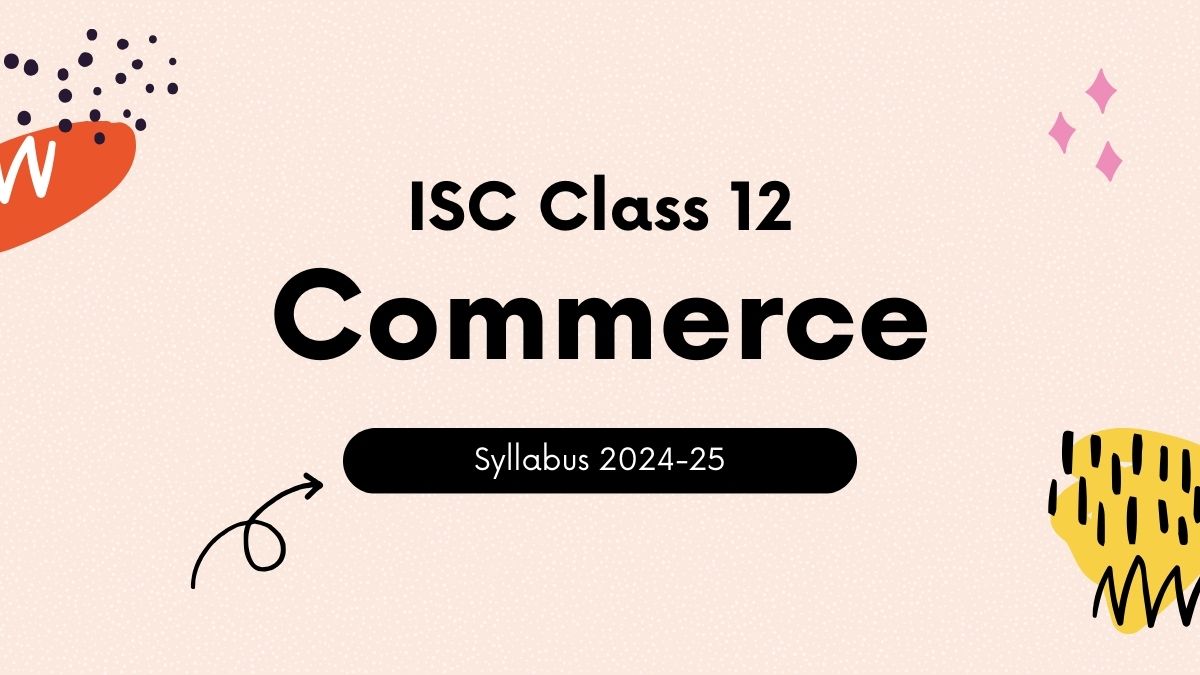The ISC Class 12 Commerce Syllabus 2024-25 is designed to provide students with a deep understanding of key business concepts, financial planning, management strategies, and modern marketing techniques. It prepares students for higher education and careers in commerce by emphasizing both theoretical knowledge and practical application through project work. This balanced approach ensures a comprehensive learning experience for commerce students.
ISC Class 12 Commerce Syllabus 2024-25
The ISC Class 12 Commerce Syllabus for 2024-25 offers a comprehensive understanding of various business concepts, financial planning, management principles, and marketing strategies. It aims to equip students with the knowledge required to excel in the field of commerce. The syllabus includes theory (Paper I) and project work (Paper II), covering topics like business environment, financing, management, marketing, and consumer protection.
Paper I – Theory (80 Marks)
1. Business Environment
- Concept and Importance: The business environment refers to the surrounding factors that impact businesses. It is important to understand as it influences decision-making and operations.
- Environmental Scanning: Meaning and purpose of analyzing business environments.
- Dimensions of Business Environment:
- Micro Environment: Internal and external factors.
- Macro Environment: Economic, social, technological, political, and legal factors.
- S.W.O.T. Analysis: An analysis of Strengths, Weaknesses, Opportunities, and Threats in business.
2. Financing
- Capital Sources:
- Sole Trader and Partnership: Sources of finance for different types of businesses.
- Financial Planning: Importance, factors affecting capital structure, and comparison of fixed and working capital.
- Sources for Joint Stock Companies:
- Shares: Equity and preference shares, bonus shares, rights issue, ESOP, and sweat equity shares.
- Loan Capital: Debentures and loans from commercial banks.
- Short-term Finance: Public deposits, trade credit, customer advances, factoring, and installment credit.
- Banking Trends:
- Online Services: RTGS, NEFT, IMPS, e-banking, mobile banking, UPI, and digital banking.
- Debit vs Credit Cards: Features and differences.
3. Management
- Meaning, Objectives, and Characteristics:
- Management is a process, discipline, and activity that helps achieve organizational goals.
- Nature of Management:
- Considered a science, art, and profession.
- Principles of Management:
- Taylor’s Scientific Principles and Fayol’s 14 Principles of management.
- Functions of Management:
- Planning: Steps, importance, and limitations.
- Organizing: Structure, formal and informal organization, centralization vs decentralization.
- Staffing: Recruitment, selection, training, and development.
- Directing: Supervision, motivation, leadership, and communication.
- Controlling: Importance and relationship with planning.
- Coordination: Coordination as the essence of management.
4. Marketing
- Concept and Functions: Marketing concepts, functions, and types of markets.
- Marketing Mix:
- Product Mix: Goods, services, branding, labeling, and packaging.
- Price Mix: Factors affecting price.
- Place Mix: Distribution channels.
- Promotion Mix: Advertising, sales promotion, personal selling, and publicity.
- Consumer Protection:
- Rights and Responsibilities of consumers and methods for consumer protection.
- Consumer Protection Act, 2019: Relevance and comparison with the 1986 act.
Paper II – Project Work (20 Marks)
Students are required to complete two projects, which will be assessed by the teacher and a visiting examiner. Each project is evaluated on the following criteria:
| Criteria | Marks |
|---|---|
| Overall format | 1 |
| Content | 4 |
| Findings | 2 |
| Viva-voce | 3 |
Suggested Projects
- Marketing Strategies Comparison: Analyze the product, price, place, and promotion strategies of two companies in the same industry.
- Consumer Court Cases: Collect and analyze five cases from the consumer court, detailing the rights violated and the outcomes.
- Banking Procedures: Study the process of opening a savings account and the services provided by a commercial bank.
- Fixed Deposits Comparison: Compare interest rates from five commercial banks and explore the procedures for opening and closing fixed deposit accounts.
- Stock Investment Analysis: Invest hypothetical money in the shares of five companies and track their price movements over a month.
- Tracking Companies in NIFTY/SENSEX: Monitor and chart the performance of companies included in these indices over a week.
- Recruitment and Selection Process Comparison: Study the recruitment and selection procedures in two companies from the same industry.
- Capital Plan for a Business: Formulate a capital plan for a hypothetical business and justify your approach.
- Organizational Structure Analysis: Compare the hierarchy, centralization, and flow of information in two companies.
-
S.W.O.T. Analysis of a Business: Conduct a SWOT analysis of any selected business.
ISC Class 12 Commerce Syllabus 2024-25 PDF Download
For students and educators seeking an easy way to access the complete syllabus, the ISC Class 12 Commerce Syllabus 2024-25 is available for download in PDF format. The PDF includes detailed content on the theory and project work, ensuring that students have a clear understanding of what to study and how to approach project work.
ISC Class 12 Commerce Syllabus 2024-25-Click Here To Download PDF

